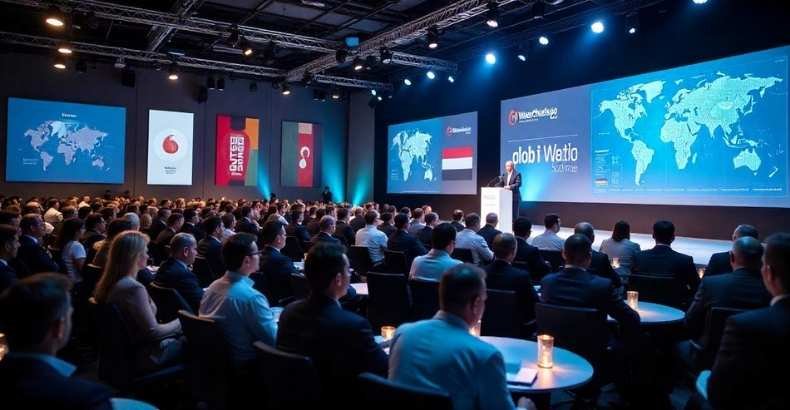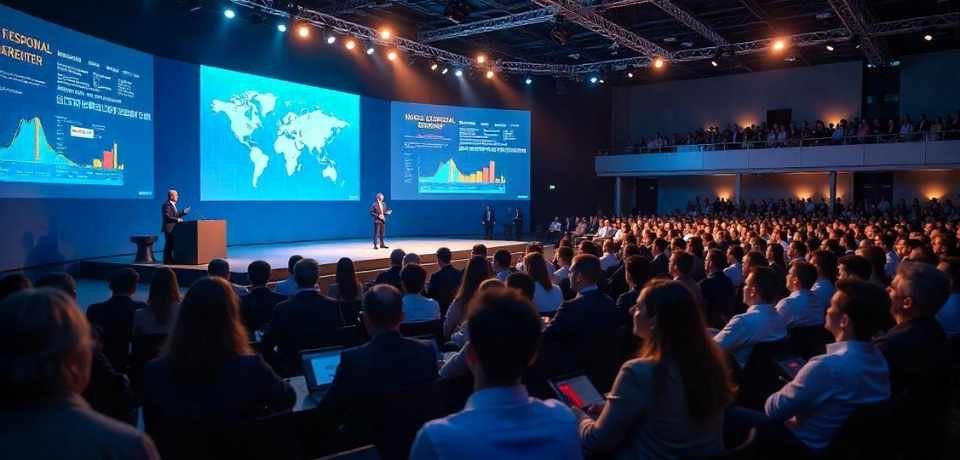International conferences are significant events for professionals in various fields. These events provide opportunities to learn, network, and share ideas. Participating in these conferences can lead to personal and professional growth.
Now the question is: How do I participate in an international conference? The first step is to identify the conference that aligns with your goals. Consider your interests and objectives for attending. Once you find a suitable conference, the next steps involve registration, preparation, and active participation.
In this article, we will explore the importance of international conferences, how to participate in them, the different types available, and tips for making the most of your experience. We will also address common questions regarding international conferences.
The Importance of International Conferences
International conferences hold great value in our increasingly interconnected global community. They serve as platforms for professionals to gather, learn, and collaborate. Attending these conferences offers numerous benefits, such as networking opportunities, exposure to industry trends, and access to thought leaders.

Networking is one of the most significant advantages of attending international conferences. You can meet professionals from different backgrounds and regions. Canada is known for hosting high-quality business conferences that attract industry leaders and experts.
For example, attending an international business conference in Canada allows participants to engage in meaningful discussions and share innovative ideas. Building these connections can lead to collaborations, partnerships, and even job opportunities.
Furthermore, learning from others who share your interests can inspire new ideas and approaches in your work. Exposure to industry trends is another crucial aspect of these conferences. Keynote speakers and panel discussions often feature experts who share insights on current developments.
How Do I Participate in an International Conference?
Participating in an international conference can be a transformative experience for personal and professional growth. If you’re considering attending business conferences in Canada or other prominent global hubs, plan and prepare effectively. Here are key steps to help you get ready:

Set Clear Goals
Before the conference, take time to outline what you want to achieve. Are you looking to network, learn new skills, or explore potential collaborations? Having clear goals will guide your actions during the event. This focus will help you stay on track and maximize your time effectively.
Review the Agenda
Once you have registered, familiarize yourself with the conference agenda. Identify sessions that align with your goals. Prioritize those that feature speakers you admire or topics that interest you. This preparation will help you make the most of your time. Reviewing the agenda also allows you to plan for networking opportunities between sessions.
Connect with Attendees
Many conferences have online platforms or social media groups for participants. Use these channels to connect with other attendees before the event. Introduce yourself and express your interest in meeting up during the conference. Building these connections early can help you establish relationships that improve your experience.
Pack Essentials
Make a checklist of items to bring with you. This may include business cards, a notebook, and a device for taking notes. Don’t forget to pack comfortable clothing and shoes, as you will likely be on your feet for extended periods. Being prepared with essentials will help you feel confident and ready for any situation.
Prepare Your Elevator Pitch
Develop a brief introduction about yourself. This elevator pitch should be concise and engaging. Aim to describe who you are, what you do, and what you hope to achieve at the conference in under a minute. Practice your pitch beforehand will ensure you deliver it smoothly when the opportunity arises.
What Are the Different Types of International Conferences?
International conferences come in various forms, catering to different audiences and purposes. Some are focused on specific industries, while others cover broader topics. Here are some common types of international conferences:
Academic Conferences
These conferences are typically organized by academic institutions or professional associations. They focus on research presentations, workshops, and discussions on various academic subjects. Attendees often include researchers, educators, and students. These events provide a platform for sharing new findings and promoting collaboration among scholars.
Industry Conferences
Industry-specific conferences bring together professionals from a particular field. These events often feature keynote speakers, panel discussions, and networking opportunities relevant to that industry. Participants can gain insights into market trends and best practices. They also offer a chance to connect with peers facing similar challenges in their respective sectors.
Trade Shows
Trade shows are events where companies showcase their products or services. They provide opportunities for networking, demonstrations, and sales. Attendees can explore new technologies and innovations relevant to their industries. These events allow businesses to gather feedback and understand consumer interests directly.
Workshops and Seminars
Workshops and seminars are smaller events that focus on hands-on learning. These sessions often involve interactive activities and discussions. Participants can deepen their knowledge and skills in a specific area. They are an excellent way to practice new techniques and receive immediate feedback from experts.
Virtual Conferences
With the rise of technology, virtual conferences have become popular. These events allow attendees to participate from anywhere in the world. They often feature live-streamed sessions and online networking opportunities. This format makes it easier for a global audience to engage without the constraints of travel.
Requirements to Participate in an International Conference
Participating in an international conference can be an enriching experience. However, several requirements must be met to ensure smooth attendance. Being aware of these prerequisites is essential for a successful experience.
Registration
First, you need to register for the conference. This often involves filling out an online form and paying a registration fee. Early registration can help you secure a spot and sometimes offer discounts. Make sure to check the deadline for registration to avoid missing out.
Travel Documentation
Travel documentation is crucial for international travel. Depending on your country of origin, you may need a passport and a visa. For those attending conferences in Canada, it is important to consider getting a visa for business conference in Canada, as this is a common requirement. Check the specific visa requirements based on your nationality.
Accommodation
Arranging accommodation in advance is also essential. Many conferences offer special rates at nearby hotels. It’s best to book your stay early to ensure you have a place to rest during the event. Consider location and budget when choosing where to stay.
Preparation of Materials
If you are presenting, prepare your materials in advance. This may include slides, handouts, or posters. Familiarize yourself with the conference format to ensure your presentation fits. Practicing your presentation can also help you feel more confident.
Networking Strategy
After all, have a networking strategy in mind. Conferences are a great opportunity to connect with other professionals. Plan whom you want to meet and how you will approach them. Being prepared can lead to valuable connections and opportunities.
Tips for Making the Most of Your Conference Experience
Maximizing your experience at an international conference requires careful preparation and active engagement. These events can be overwhelming, but with the right approach, you can gain valuable insights and make meaningful connections. Here are some practical tips to help you make the most of your time at the conference.
- Engage Actively: Don’t be a passive attendee. Engage actively in discussions and ask questions during sessions. This will help you connect with speakers and other participants, enhancing your overall experience.
- Network Strategically: Focus on quality over quantity when networking. Instead of trying to meet everyone, aim to establish meaningful connections with a few key individuals. This can lead to more fruitful discussions and collaborations.
- Utilize Social Media: Use social media to document your experience and share insights. Many conferences have official hashtags. Engage with other attendees online to develop connections and keep the conversation going after the event.
- Follow-Up: After the conference, follow up with the people you met. Send them a personalized message or email referencing your conversation. This will help solidify the connection and keep the lines of communication open.
- Apply What You Learned: Take time to review your notes and reflect on what you learned. Consider how you can apply these insights in your work or projects. Sharing your newfound knowledge with colleagues can also reinforce your expertise.
What to Expect During an International Conference?
It can be exciting to attend an international conference. It offers many chances to learn and network. However, know what to expect to make the most of it. You will be able to prepare well if you understand the schedule and interactions. This way, you can get around the event smoothly and enjoy your time.

Agenda and Structure
Most conferences have a structured agenda that includes keynote speeches, panel discussions, and networking events. Familiarize yourself with the agenda ahead of time to prioritize sessions that align with your interests.
Networking Opportunities
Expect to meet a diverse range of attendees. Networking can happen during breaks, lunches, or dedicated networking sessions. Use these opportunities to introduce yourself and engage in meaningful conversations. International conferences provide a unique opportunity for cultural exchange. Be open-minded and respectful of cultural differences.
Learning Environment
Conferences are designed to be learning environments. Be prepared to take notes during presentations and participate actively in discussions. This will help you retain valuable information and gain new insights. After the conference, reflect on your experience and consider what you learned. Follow up with contacts and implement insights gained from the event. This reflection will help you maximize the value of your attendance.
Frequently Asked Questions (FAQs)
We address some common questions regarding participation in international conferences. From preparation tips to networking strategies, we aim to cover the essential aspects of making the most out of your conference trip.
How Do I Participate in an International Conference Effectively?
To participate effectively in an international conference, set clear goals before attending. Research the agenda, identify key sessions, and prepare to engage actively. Networking with fellow attendees and following up afterwards will upgrade your experience. Taking the time to prepare will ensure you make the most of every opportunity presented at the event.
What Should I Bring to an International Conference?
When attending an international conference, bring business cards, a notebook, and a device for taking notes. Comfortable clothing and shoes are also essential, as you may spend long hours on your feet. Don’t forget chargers for your devices! Being well-prepared with essentials will help you feel confident and ready to participate fully.
How Can I Find International Conferences in My Field?
You can find international conferences in your field by searching online through industry websites and social media. Professional associations and academic institutions often list upcoming events. Networking with colleagues can also provide recommendations. Additionally, subscribing to newsletters from relevant organizations can keep you updated on new conference announcements.
Are Virtual Conferences as Valuable as In-Person Events?
Virtual conferences can be valuable, offering convenience and accessibility. However, they may lack the face-to-face networking opportunities found at in-person events. The value of each type depends on individual preferences and goals. Many professionals find that combining both formats can offer the best of both worlds.
What Is the Best Way to Follow Up After a Conference?
The best way to follow up after a conference is to send personalized messages to contacts you made. Reference your conversation and express interest in staying connected. Connecting on LinkedIn can also help maintain the relationship. This follow-up can solidify the connections you’ve made and lead to future opportunities.
Final Words
Participating in an international conference can significantly boost your professional career. These events offer excellent opportunities to connect with industry leaders, learn from experts, and gain insights that can benefit your career. By engaging yourself in this vibrant environment, you can open doors to new possibilities.
So, how do I participate in an international conference? First, identify a conference that aligns with your interests and goals. Then, register early and prepare by reviewing the agenda, connecting with attendees, and setting clear objectives.
Actively engaging during the event will ensure you maximize your experience. As you prepare for your next conference, remember to be proactive and open-minded. Take notes, network strategically, and follow up with new contacts afterwards.